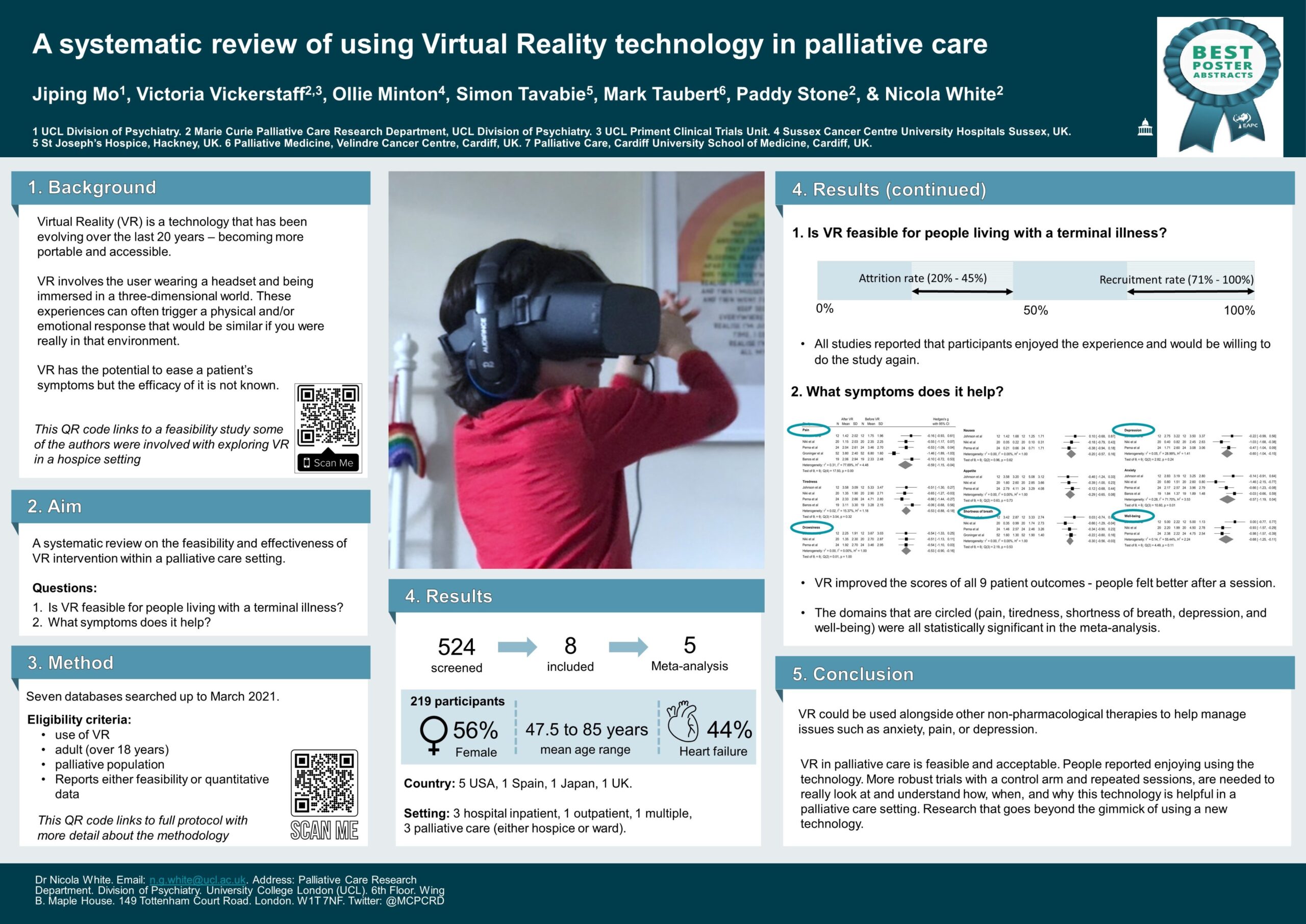By Dr. Nicola White, Research Fellow, Marie Curie Research Department, University College London
One of six winning conference poster abstracts from the 12th World Research Congress of the European Association for Palliative Care 2022 is outlined in this article. The abstract summarises a systematic review and meta-analysis in virtual reality (VR) technology and its current evidence base. In particular, how does VR fit in to clinical practice in palliative care in 2022? Dr Nicola White, a member of the research team that conducted the systematic review and meta-analysis, summarises the findings, channelling the funk and acid jazz band Jamiroquai
Co-Authors: Jiping Mo, Victoria Vickerstaff, Oliver Minton, Simon Tavabie, Mark Taubert, Paddy Stone
“Oh, this world
He’s got to change
‘Cause I just
I just can’t keep going on in this virtual, virtual insanity
That we’re living in, that we’re living in
And that virtual insanity is what is”
How rapidly technology seems to be advancing in the 21st century. Back in 1996, when ‘Virtual Insanity’ nearly made it to No. 1 in the charts, the installation of cutting edge fax machines was still high on the agenda in healthcare settings, emails were an occasional indulgence, and palliative care was coming out of the shadows. Google hadn’t been invented yet. Ten years later we were all trying to get our jazz-hands on fancy TENS machines, vlogs started to make an appearance and the sound of the dial-up internet ‘modem’ was still in our lives. James Blunt told us that we were beautiful. As far back as 2016 loyal readers may remember Dr Ollie Minton’s attempt to predict how we’d all be using technology: It’s good to talk and even better to communicate effectively – BMJ Supportive & Palliative Care. Adele said Hello, Justin Bieber said Sorry and David Bowie said Good-bye, in that year.
Could we have predicted the advance of technology, video messaging software, and use of virtual reality in everyday life? All of a sudden, here in post-pandemic 2022, there is likely to be a virtual reality headset in every hospice, cancer ward, hospital outpatient department. Is it just a fad, or will it stay?
Our research team decided to look into some of the evidence, and find out what further evidence may be needed. Our journal paper [1] and conference abstract [2] summarize some of the key findings, discrepancies, weaknesses, strengths and future needs.
We combined previous data from studies that had explored the use of virtual reality for people who have a terminal illness. Eight studies were included, three were included in the meta-analysis. All studies had at least some concern for risk of bias. 225 patients used the VR technology. Patient diagnoses included cancer (3/8; 37.5%), advanced heart disease (1/8; 12.5%) and dementia (1/8; 12.5%). 44% (97/219) were male; the mean age ranged from 47 to 85 (years). Recruitment was feasible and retention rates ranged between 55% and 100%.
Overall, participants reported a positive experience with using VR and were happy to repeat the experience. Discomfort and technical issues were recorded in 4/7 studies (57%). The meta-analysis showed limited evidence for VR across the domains of the ESAS-r. Existing studies provided valuable insights and guidance into how to set up VR in clinical practice settings, and the challenges to expect.
There are three key take home messages:
1) People enjoyed using the technology
2) People felt better after using the technology; with several outcomes (such as pain & depression) significantly improving after use. Was this merely the novelty of using such a product, or did it really have an effect?
3) We need focussed and unbiased research to understand what the benefits of this technology really are, including clever ways to introduce a placebo. For instance, how do you placebo-control a VR study?
We were delighted that this poster won overall conference prize in the category ‘New technologies and digital health’ and even scooped overall conference runner-up prize at the closing ceremony of the EAPC World Research Congress 2022.
There is much to do, before we descend into virtual insanity, but if we want to increase variety of the products at our disposal to effectively manage distress and symptoms in palliative care (beyond pharmaceuticals), then we need to approach all of this with an open mind. And of course, research equipoise.
PS: “Palliative care community Jamiroquai fans, it’s Jay Kay calling you from outer space to ask you to join the metaverse VR revolution. Or not, if you rather just shut it all out and scream, but remember to make it evidence-based!”

[1] Mo, J., Vickerstaff, V., Minton, O., Tavabie, S., Taubert, M., Stone, P. and White, N How effective is virtual reality technology in palliative care? A systematic review and meta-analysis. Palliative Medicine. May 2022. doi:10.1177/02692163221099584
[2] Mo, J., Minton, O., Tavabie, S., Taubert, M., Stone, P. and White, N. 2022. A systematic review of using virtual reality technology in palliative care. Presented at: 12th World Research Congress of the EAPC, online, 18-20 May 2022 Abstracts from the 12th World Research Congress of the European Association for Palliative Care, Vol. 36. Vol. 1-supp. SAGE Publications pp. 110.
